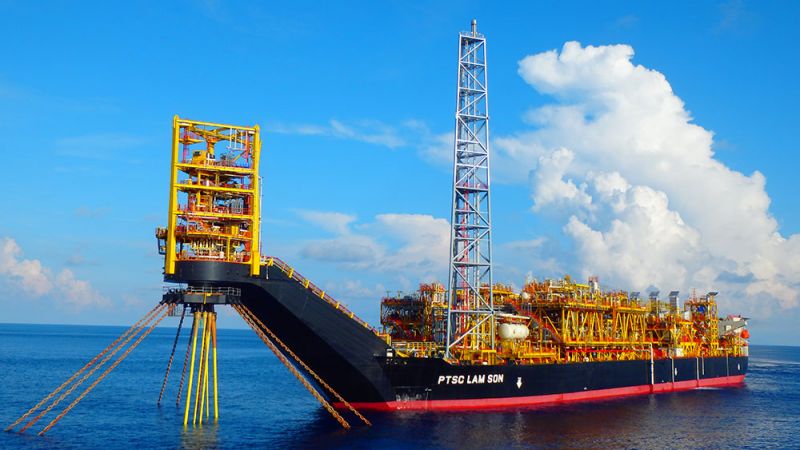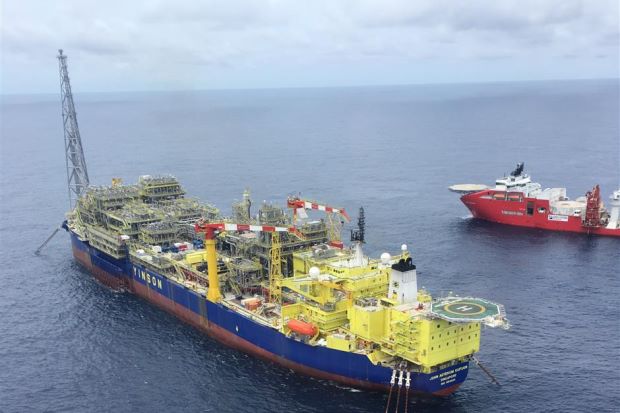FPSO Company
A floating production storage and offloading (FPSO) unit is a floating vessel used by the offshore oil and gas industry to produce and process hydrocarbons and oil storage. FPSO ships are designed to receive hydrocarbons produced by themselves, hydrocarbons from nearby platforms or subsea templates, process and store oil until it can be unloaded onto tankers or transported less frequently via pipelines.
FPSO is easy to install and does not require local pipeline infrastructure to export oil, so it is preferred in offshore areas along the border. FPSO can be a modification of an oil tanker or a vessel built specifically for this application. Containers that are only used to store oil (no processing) are called floating storage and offload (FSO) containers.


What is FPSO?
Oil companies use FPSO (floating product storage and offloading) systems extensively to store oil from oil rigs in the central ocean and the high seas. It is one of the best-designed systems developed in the petroleum exploration industry in marine areas.
FPSO, as its name suggests, is a floating device that allows oil rigs not only to store oil freely, but also to produce or refine oil, and then finally unload it to the required industrial area through containers or with the help of. Pipes built underwater.
The use of this system ensures that shipping companies do not have to invest even more money by ferrying the raw and crude oil to an onshore refinery before transferring it to the required industrial areas. In simple terms, the FPSO saves time and money effectively.
The following steps will elaborate on the different functions performed by the FPSO as a system:
Production: The “P” in FPSO stands for production. Production means the continuous development of crude oil obtained from the depths of the ocean. FPSO has been commissioned and is equipped with equipment that can be used as a refinery to distill off the oil obtained from the ocean along with the emitted gases. This is the main function of FPSO, because only with this function can FPSO get the reliability that it enjoys today.
Storage: This is the second most important feature and is the abbreviation “S” for FPSO. The second important point is that just as the produced oil filtered from marine reservoirs is important, so is storage. To this end, the FPSO is constructed in a way that makes tubes, tubes and tanks ideal for storing distillate products from crude oil feedstocks. They are safe and sturdy, and can withstand any undesired oil spills, thereby avoiding pollution of marine life.
Offload: In FPSO, this is “O”. The offloading aspect is important when the FPSO must transfer its contents to a vessel designed as a tanker or a pipeline acting as a transfer agent. In simple terms, unloading refers to unloading cargo in FPSO and transferring it to another cargo ship or equipment. Since the process is carried out in the sea, the unloading part is very tricky and requires concentration and concentration to avoid any form of overflow.
Reasons why FPSOs are the future of oil and gas
FPSOs can move from field to field
FPSO is considered an ideal solution for developing marginal oil fields-so it is well-suited for deployment in a world where conventional reserves are rapidly depleted. Once the hydrocarbon source has stalled at a particular location, the FPSO unit can move to the next target. In this way, the owner / operator does not need to build and maintain expensive platforms under economically suspicious circumstances, while maintaining value by using reusable units.


FPSO can escape bad weather
Unlike fixed-position cousins, FPSO is a mobile unit, so it can avoid potentially dangerous weather conditions. Permanent installations are vulnerable in hurricanes such as the Gulf of Mexico, the South China Sea and other cyclone-filled waters around the Arctic Circle, and FPSO can migrate and avoid these dangers.
FPSO is ideal for deep water drilling
As operators must drill black gold deeper than ever before, deep and ultra-deep waters like the Santos Basin, the Lower Tertiary and the Arctic are becoming a more reasonable option for the oil-hungry world. In these areas, underground pipelines will face logistical challenges, and the export of shuttle tankers will become increasingly expensive, while FPSO will combine tailored upstream and midstream devices into one, providing the best of both worlds.
Australia leads in the deployment of FPSOs in the Asia-Pacific region
According to a report by GlobalData, it is estimated that by 2025, 67 floating production, storage and offloading (FPSO) vessels will be put into operation globally, of which Australia will lead the Asia Pacific region.
South America and Brazil
The data and analysis company report found that as a region, South America will continue to dominate 30 planned FPSOs, followed by Africa and Europe with 14 and 6 FPSOs, respectively. Nationally, Brazil will continue to lead 23 planned and announced FPSOs, followed by Australia and Angola, each with 5 FPSOs. There are four and three FPSOs in the Falkland Islands and Guyana planning respectively during the relevant period. Among operators, Petroleo Brasileiro SA leads with 20 planned and announced FPSOs, followed by Modec Inc and Premier Oil Plc with three FPSOs each.
Africa
In the Africa region, seven planned and announced FPSOs are expected to go live in seven countries. Angola is expected to start the largest number of FPSOs in the region, with five, followed by Nigeria with four. South Africa, Mauritania, Tunisia, Ghana and Senegal each have one FPSO planned.
Europe, Oceania and Asia
There are 6 planned and announced FPSOs in Europe, and 3 in the UK and Norway each.
In Oceania, five planned and announced FPSOs are expected to go live in Australia. In North America, Mexico has 3 announced FPSOs, while the United States and Canada each have 1 announced FPSO.
In Asia, four planned and announced FPSOs are expected to be operational. India is headed by two FPSOs, followed by Indonesia and China, each with one FPSO.
Israel
The GlobalData report found that Israel’s planned FPSO, Karish, is scheduled to begin operations in 2021.